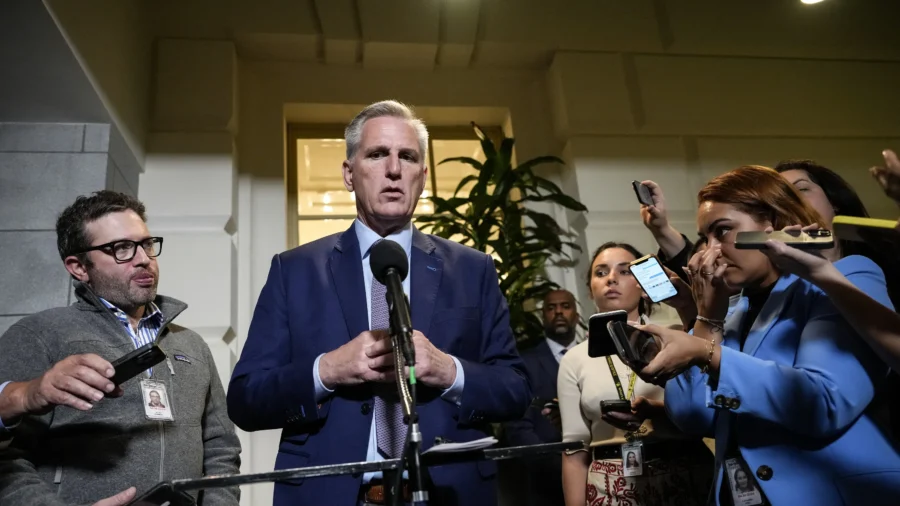Republicans failed to pass a procedural vote on the consideration of the defense appropriations bill, effectively blocking its consideration by the House.
The failed vote is the latest setback to House Speaker Kevin McCarthy (R-Calif.) in his effort to keep the fractious Republican caucus together and complete the 2024 appropriations process.
The vote failed 212–214 with Reps. Matt Rosendale (R-Mont.), Dan Bishop (R-N.C.), Ralph Norman (R-S.C.), and Ken Buck (R-Colo.) opposing their Republican majority. Rep. Victoria Spartz (R-Ind.) initially voted against the rule but changed her vote to yes.
Mr. McCarthy had delayed the vote, originally scheduled for Sept. 13, in an unsuccessful effort to whip votes.
Earlier in the day, Mr. McCarthy appeared to question the aims of those opposing Republican spending initiatives in comments to reporters.
“If you’re not going to pass individual bills, you’re not going to pass a short-term CR that allows us to pass the individual bills to help the border get secure, if you don’t want to pass Homeland [Security appropriations], then want to do you want to do?” the speaker asked rhetorically.
“If you run for office, you should be willing to govern. And the thing I want to show the American public is that we can govern in a conservative manner and you can have a stronger country,” he said.
After the vote, Rep. Jim McGovern (D-Mass.) criticized Republican leaders for giving ground to the far-right wing of their party. “They keep on negotiating with their extreme right to go farther and farther in a direction that, quite frankly, will not be welcomed by Senate Democrats or Senate Republicans,” Mr. McGovern said. “This is a ridiculous game they’re playing.”
The setback may be an occasion to build consensus, according to Rep. Don Bacon (R-Neb.). “We’ve got a four-seat majority, and we are all captured by a small number,” Mr. Bacon told reporters. Musing on the writings of James Madison, John Jay, and Alexander Hamilton, Mr. Bacon said: “They talk about protecting the minority. In this case, it forces working across the aisle to get consensus. That’s what we should be doing to begin with.”
The bill funds all agencies and programs under the jurisdiction of the Department of Defense and the intelligence community, including the Central Intelligence Agency and the National Security Agency. For Fiscal Year 2024, the bill includes $826. billion in new discretionary spending, $286 million over the president’s budget request, and $28.71 billion over the previous year, an increase of 3.6 percent.
Among other provisions, the bill authorizes a 5.2 percent pay increase for service members, including a 30 percent increase on average for junior enlisted personnel.
From The Epoch Times

